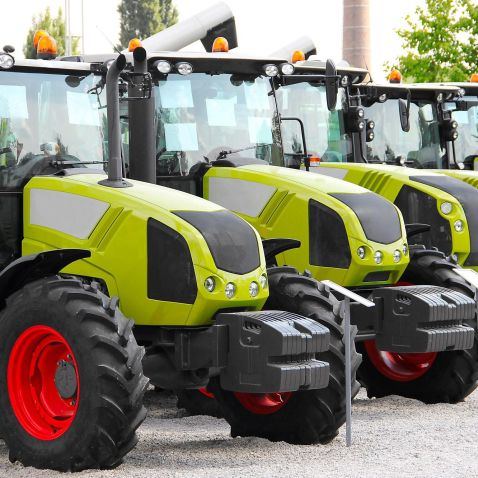Agriculture
Rubber seals are crucial in agricultural machinery, ensuring reliable performance, minimizing leaks, and protecting equipment components from harsh working conditions. Agricultural machinery operates in challenging environments, expos ed to dust, dirt, moisture, chemicals, and extreme temperatures, which makes durable and well-designed seals essential. Here’s an overview of how rubber seals are applied across various systems in agricultural equipment:
1. Hydraulic Systems
Rubber seals in hydraulic cylinders prevent leaks of hydraulic fluid, ensuring consistent pressure and smooth operation.
2. Engines and Gearboxes
Rubber seals prevent leaks of oil, fuel, and coolant, protecting engine components from wear and enabling efficient operation.
3. Fuel and Water Tanks
Rubber seals and gaskets in fuel and water tanks prevent leaks, ensuring the safe storage of necessary fluids for machinery operation.
4. Braking Systems
Braking systems use rubber seals to maintain hydraulic pressure, ensuring effective braking performance.
5. Spraying Equipment
Rubber seals in spraying systems prevent leaks in pumps, hoses, and nozzles, enabling precise application of fertilizers, pesticides, and other chemicals.
The Type of Material Used:
1. EPDM (Ethylene Propylene Diene Monomer)
Properties: Excellent resistance to weathering, ozone, UV radiation, and aging. It also performs well in both high and low-temperature environments and offers good chemical resistance.
Applications: Seals, gaskets, hoses, and vibration dampeners in agricultural equipment, irrigation systems, and water pipes.
Temperature Range:-50°C to 150°C (-58°F to 302°F).
2. Nitrile Rubber (NBR)
Properties: Known for excellent oil, fuel, and chemical resistance, as well as good abrasion resistance.
Applications: Seals, gaskets, hoses, and O-rings used in agricultural equipment, especially in areas where the rubber is exposed to oils, fuels, and chemicals.
Temperature Range: -30°C to 100°C (-22°F to 212°F).
3. Chloroprene Rubber (CR or Neoprene)
Properties: Neoprene offers good resistance to oils, weathering, ozone, and certain chemicals, along with moderate flame resistance.
Applications: Seals, gaskets, hoses, and vibration dampers in agricultural machinery and irrigation systems.
Temperature Range: -40°C to 120°C (-40°F to 248°F).
4. Silicone Rubber (VMQ)
Properties: Silicone rubber is highly flexible and can tolerate a broad range of temperatures (both high and low). It also has excellent resistance to weathering, UV radiation, and ozone.
Applications: Gaskets, seals, and hoses in agricultural systems exposed to extreme temperatures or requiring high flexibility.
Temperature Range: -50°C to 230°C (-58°F to 446°F).
5. Fluoroelastomers (FKM)
Properties: Known for superior chemical resistance, high-temperature stability, and durability in harsh environments.
Applications: Seals, gaskets, and O-rings in agricultural machinery and equipment exposed to aggressive chemicals, fuels, and high heat.
Temperature Range: -25°C to 200°C (-13°F to 392°F).




